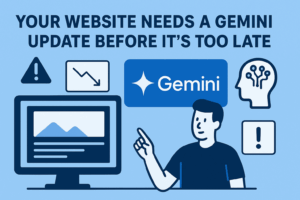
Google just fundamentally changed how search works, and most businesses haven’t noticed yet.
On November 18, 2025, Google rolled out Gemini 3 Pro directly into its search engine for the first time. This isn’t another algorithm update you can ignore. AI Overviews now reach 2 billion users per month, and the way people find your business online has permanently shifted.
The Traffic Cliff Nobody Saw Coming
Here’s what the data shows: organic click-through rates for queries with AI Overviews have dropped from 1.76% to 0.61%. That’s a 65% decline in website visits for the same search visibility.
But here’s the critical part that most agencies miss: when you’re cited in an AI Overview, you get 35% more organic clicks and 91% more paid clicks compared to when you’re not cited at all.
The divide isn’t between businesses that show up in search results anymore. It’s between businesses that get cited by Google’s AI and those that don’t.
Why Traditional SEO Suddenly Stopped Working
For 25 years, SEO meant optimizing for blue links. You targeted keywords, built backlinks, and hoped to rank on page one. That playbook is obsolete.
Gemini 3 in AI Mode can dynamically create the ideal visual layout for responses on the fly, featuring interactive tools and simulations tailored to your query. Google isn’t sending people to your website to find answers anymore. It’s answering questions directly, then citing sources it considers authoritative.
Your content now competes against AI-generated summaries that synthesize information from multiple sources into one consolidated answer. Unlike featured snippets, which extract a sentence or two from a single source, AI Overviews attempt to consolidate knowledge from multiple sources to present users with a unified answer.
If Google’s AI doesn’t recognize your content as citation-worthy, you’ve become invisible.
The New Rules for Getting Cited
After analyzing hundreds of AI Overview citations across client accounts, the pattern is clear. Google’s AI doesn’t cite content the same way humans rank websites. It looks for specific structural and authority signals.
Google wants to show content that fulfills peoples’ needs, with unique, non-commodity content that visitors from Search will find helpful and satisfying. But the execution requires precision most websites don’t have.
Your content must be mobile-first, not just mobile-friendly. Google uses the mobile version of websites to decide what content appears in the AI Overviews. If your mobile experience isn’t flawless, you’re automatically disqualified.
Experience, Expertise, Authoritativeness, and Trustworthiness matter more than ever. This principle is critical to being listed in AI Overviews and can increase the web traffic a website receives. Generic content written by anonymous contributors won’t cut it anymore.
Structure beats creativity in AI citations. Content needs clear question-and-answer formats, schema markup, and factual accuracy backed by credible sources. Generative AI is trained to detect and pull clear answers to specific questions.
The Five Updates Your Website Needs This Month
First, audit your mobile performance ruthlessly. Google’s AI prioritizes mobile versions exclusively. Every page must load in under three seconds, display perfectly on smartphones, and provide effortless navigation. No excuses.
Second, implement comprehensive schema markup across your entire site. This structured data helps Google’s AI understand and categorize your content accurately. Focus on FAQ schema, How-To schema, and Organization schema at minimum.
Third, rewrite your core content pages to answer specific questions directly. Start each article with a concise 50 to 70 word summary that provides an immediate answer. Don’t bury your key information deep in the article; lead with the answer.
Fourth, establish clear author credentials and expertise signals. Every piece of content should have a named author with a detailed bio, credentials, and verifiable expertise in the subject matter. Anonymous blog posts are worthless for AI citation.
Fifth, prioritize depth over breadth. Publishing less content but increasing the quality of information you release will go a long way in helping achieve this. One comprehensive, authoritative resource beats ten mediocre articles.
What Most Agencies Get Wrong
I see agencies telling clients to wait and see how this plays out, or suggesting minor tweaks to existing content strategies. That’s malpractice.
AI Mode requires users to change their behavior, they’ll have to select a different tab to start searching. But AI Overviews appear automatically in traditional search for billions of users. You can’t afford to treat this as experimental.
The companies acting now are securing citation dominance in their industries while competitors debate whether this matters. By the time the data becomes undeniable, the authoritative positions will be locked in.
The Reality Check Nobody Wants to Hear
Your website traffic is going to decline regardless of what you do. Based on 15 months of consistent decline across nearly every metric, the search landscape is fundamentally different than it was 18 months ago.
The question isn’t whether you’ll lose traffic. It’s whether you’ll be one of the cited sources that maintains visibility and captures the remaining clicks, or one of the invisible sites that gets buried beneath AI-generated summaries.
Success metrics are shifting from clicks and traffic to visibility and share of voice. If you’re still measuring SEO success purely by website visits, you’re optimizing for the wrong metric.
Moving Forward
Google’s integration of Gemini 3 into search represents the biggest shift in online marketing since mobile-first indexing. The businesses that adapt quickly will dominate their markets. Those that wait will find themselves competing for scraps.
Update your website now. Focus on mobile performance, structured data, clear answers, demonstrated expertise, and authoritative depth. These aren’t nice-to-have optimizations anymore. They’re survival requirements.
The era of relying on page rankings alone is over. Welcome to the citation economy, where being mentioned by AI matters more than where you rank in a list of links most people never scroll through.
Contact us today for a no cost assessment on what this means to your current website.
